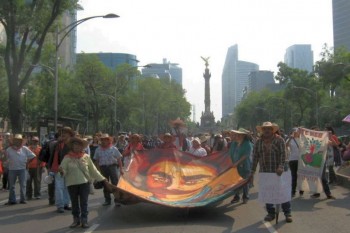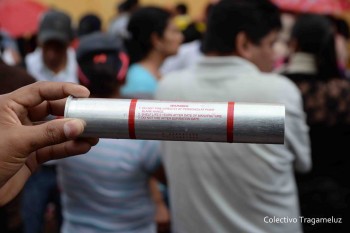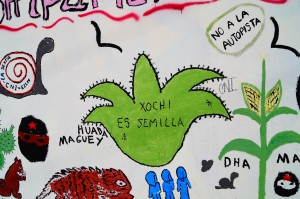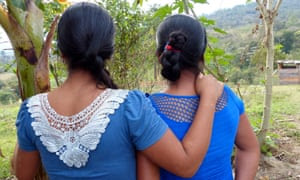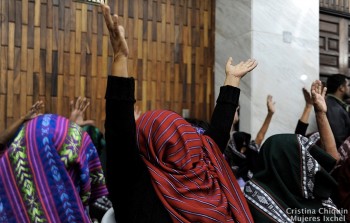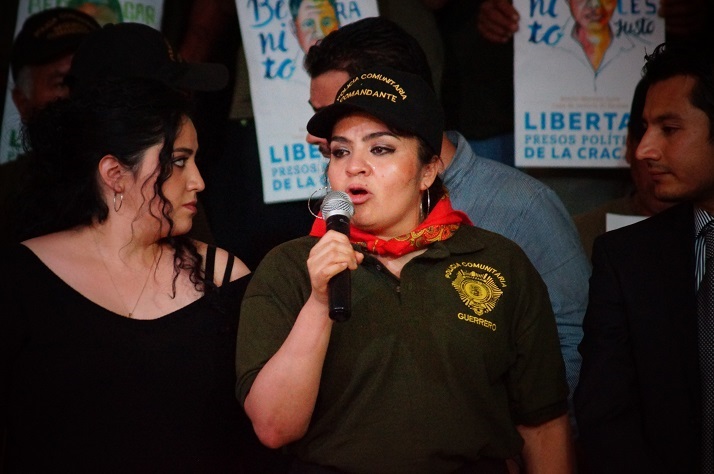Sorry, this entry is only available in Español. For the sake of viewer convenience, the content is shown below in the alternative language. You may click the link to switch the active language.
EJERCITO ZAPATISTA DE LIBERACION NACIONAL.
JUNTAS DE BUEN GOBIERNO
BASES DE APOYO ZAPATISTAS
SEXTA NACIONAL E INTERNACIONAL
A LA RED CONTRA LA REPRESION Y LA SOLIDARIDAD
REPRESION Y DESPOJO POR PARTE DEL GOBIERNO DE LA CIUDAD DE MEXICO Y JEFATURA DELEGACIONAL EN CUAUHTEMOC.
Los días 31 de marzo por la noche y madrugada del 1o. de abril del 2016, llegaron al EJE UNO NORTE/TEPITO, 500 granaderos y con ellos un equipo de asalto portando metralletas, despojándonos a 120 familias comerciantes de nuestra fuente de trabajo. El operativo se ejecutó en las estaciones del metro Garibaldi-Lagunilla, Lagunilla y Tepito, cercando con entarimados diez metros a la redonda en acera sur, y en lado norte más de 20 metros. Cuando nos sentamos en nuestros espacios de trabajo para impedir pacíficamente la infamia de que estábamos siendo objeto, los granaderos nos obligaron a levantar golpeando con los escudos y amenazando los funcionarios JOSE FRANCISCO ACEVEDO GARCIA, SUBSECRETARIO DE PROGRAMAS DELEGACIONALES y HORACIO ROBLES OJEDA, DIRECTOR GENERAL DE GOBIERNO que comandaban el operativo. Metieron maquinaria roto-martillo para levantar el concreto, cortando una parte de los techos del corredor comercial.
Por la resistencia a la represión, desprecio y despojo de que fuimos objeto, se estableció una MESA DE TRABAJO con el gobierno capitalino. Se informó que el operativo continuaría de abril a agosto porque se pretende tener una zona comercial sustentable, segura con movilidad y moderna. Mediante un procedimiento burocrático se promete reubicación en lugares cercanos.
Nosotros les manifestamos a los funcionarios que continuaríamos con la resistencia civil y pacífica para lograr se respete nuestro derecho al trabajo digno como lo hemos hechos durante años, desde nuestro abuelos. No aceptamos la imposición porque se deja sin sustento a más de 500 NIÑAS, NIÑOS, JOVENES Y ANCIANOS QUE DEPENDE DE CADA LUGAR DE TRABAJO.
Marcelo Ebrard intento en 2007 , despojarnos y desalojar a más de 20 mil familias del barrio, con la intención de dejarlo a los grandes emporios financieros y comerciales como Wal-Mart, Mitsubishi, Palacio de Hierro, Martí, HSBC.., y demás. Pero la resistencia del barrio lo venció. Hacemos responsable de cualquier agresión al gobierno capitalino, ante la decisión de los comerciantes de organizarnos de manera autónoma e independiente.
ATENTAMENTE .
COMERCIANTES DEL EJE UNO NORTE

